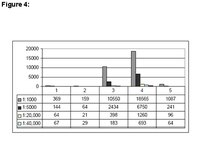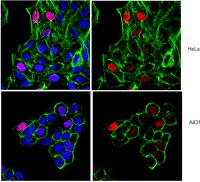An ARID domain-containing protein within nuclear bodies is required for sperm cell formation in Arabidopsis thaliana.
Zheng, B; He, H; Zheng, Y; Wu, W; McCormick, S
PLoS genetics
10
e1004421
2014
Mostra il sommario
In plants, each male meiotic product undergoes mitosis, and then one of the resulting cells divides again, yielding a three-celled pollen grain comprised of a vegetative cell and two sperm cells. Several genes have been found to act in this process, and DUO1 (DUO POLLEN 1), a transcription factor, plays a key role in sperm cell formation by activating expression of several germline genes. But how DUO1 itself is activated and how sperm cell formation is initiated remain unknown. To expand our understanding of sperm cell formation, we characterized an ARID (AT-Rich Interacting Domain)-containing protein, ARID1, that is specifically required for sperm cell formation in Arabidopsis. ARID1 localizes within nuclear bodies that are transiently present in the generative cell from which sperm cells arise, coincident with the timing of DUO1 activation. An arid1 mutant and antisense arid1 plants had an increased incidence of pollen with only a single sperm-like cell and exhibited reduced fertility as well as reduced expression of DUO1. In vitro and in vivo evidence showed that ARID1 binds to the DUO1 promoter. Lastly, we found that ARID1 physically associates with histone deacetylase 8 and that histone acetylation, which in wild type is evident only in sperm, expanded to the vegetative cell nucleus in the arid1 mutant. This study identifies a novel component required for sperm cell formation in plants and uncovers a direct positive regulatory role of ARID1 on DUO1 through association with histone acetylation. | 25057814
 |












